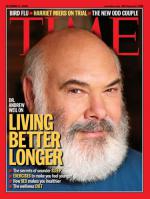Disable ads!
Andrew Weil
There have been questions about his promotion of certain products, as well as the money he makes from them, saying the money goes to the Program in Integrative Medicine, which he heads, and to his foundation. A reporter found such statements inaccurate or evasive. For example, she found food in his house containing refined sugar and a "slash of chocolate" and other foods incongruent with his stances on health. And contrary to the message of his new book at the time Healthy Aging: A Lifelong Guide to Your Physical and Spiritual Well-Being, that advises that aging should be accepted as a natural stage in life, a brand of skin care products sold at Macy's was advertised "To optimize skin's defense against aging" along with a large picture of Weil in the store. Some medical professionals have criticized Weil for promoting unverified beliefs. Weil's rejection of some aspects of evidence-based medicine, along with his promotion of alternative medicine practices that are not verifiably efficacious, has been criticized by some mainstream physicians, such as Arnold S. Relman, editor in chief of The New England Journal of Medicine, in his 1998 article "A Trip to Stonesville: Some Notes on Andrew Weil". Weil has also been criticized for the promotion of some of his food products, such as fruit and nut bars, as he combined his personal brand with Arran Stephens' Nature's Path brand. The late Barry Beyerstein [1947-2007], PhD at Simon Fraser University, had further criticized Weil and various aspects of complementary and alternative medicine (CAM), asserting that "CAM shares the movement's magical world-view. On advocating emotional criteria for truth over criteria based on empirical data and logic, New Age medical gurus such as Andrew Weil and Deepak Chopra have convinced many that 'anything goes.'" Beyerstein later went on to state that, "By denigrating science, these detractors have enlarged the potential following for magical and pseudoscientific health product." Simon Singh further echoes Beyerstein's criticism by saying that while Weil promotes some good things, like exercise and less smoking, "much of his advice is nonsense". Dr. Steven Knope of Tucson, Arizona, criticized Weil in a debate televised on public television affiliate KUAT-TV. Knope chastised Weil for what he considered irresponsible advocacy of untested treatments. As to a piece of journalism that Weil wrote in Time Magazine, the Center for Science in the Public Interest pointed out Weil touts the benefits of fish oil supplements but fails to disclose that Weil sells his own brand of fish oil supplements on his Web site." In 2009, the US Food and Drug Administration went so far as to send a warning letter to a company associated with Weil, Weil Lifestyle LLC, as part of an "urgent measure" to protect consumers from products that lacked approval or authorization by the FDA but claimed to diagnose, mitigate, prevent, treat, or cure H1N1 flu virus. The FDA was primarily concerned with several implicit claims, in Weil Lifestyle LLC's marketing literature, that certain products could help ward off such virus.
 Read more on wikipedia.org Read more on wikipedia.org
 All quotes by Andrew Weil All quotes by Andrew Weil
 Edit Edit
|

|
|
|
|
|
Background photo by Giuliana
|